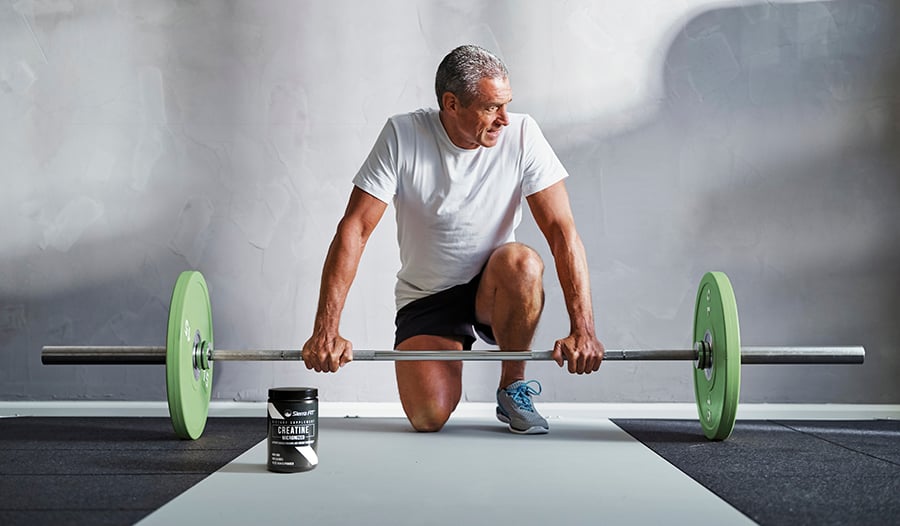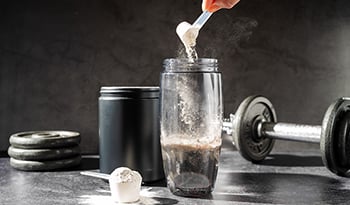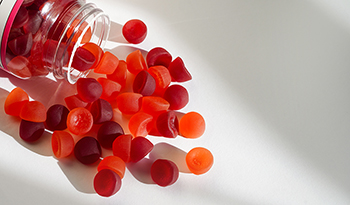Creatine Myths: A Doctor Debunks Common Misconceptions

Creatine is a supplement often used by athletes and bodybuilders for high-intensity exercise to boost strength, resist fatigue, and improve recovery. Even though it’s one of the most widely researched supplements in sports nutrition, there are still a lot of misconceptions about it. So let’s debunk some of the most common myths about this popular supplement.
Key Takeaways
- Creatine is safe for healthy individuals; no evidence of harm to kidney function in standard doses.
- Creatine is not a steroid. It is an amino acid derivative found naturally in meat and the human body.
- Loading phases may cause temporary water retention, but low-dose maintenance usually does not.
- Creatine is beneficial for bodybuilders, runners, vegetarians, and those seeking cognitive and muscle health benefits.
Myth: You can use creatine to build muscle mass without exercise
Research has shown improved strength in those with muscular dystrophy who take creatine even though they weren’t exercising. However, in healthy humans, creatine consumption should be combined with resistance training in order to see an appreciable effect.
Myth: Creatine causes fat gain
The weight gain you see when initially starting creatine is not due to gaining fat but is related to the increased water content in your muscle tissue. The creatine molecule strongly attracts water, pulling it into your muscles.
Over the long term, those using creatine may experience continued weight gain. However, this is generally due to increased muscle growth, not because of increased body fat.
Myth: Creatine causes you to retain excess water
Many bodybuilders who use creatine believe that creatine supplementation causes the body to hold extra water, which impacts their muscle definition, making them look “soft.” So they stop taking creatine a few weeks before a competition.
However, as already described, the great majority of creatine is stored in your muscles. So it would be difficult to explain how it causes water to collect subcutaneously (meaning “under the skin”). It’s more likely that the “soft” look caused by subcutaneous water is not because of creatine itself, but related to the use of a low-quality creatine product that may be giving you excess sodium.
Myth: Once you stop taking creatine, you will lose the muscle you gained
It is possible that your muscle size will decrease after you discontinue creatine. However, as long as you continue all other aspects of your regimen, including adequate nutrition and resistance training, you can maintain your strength and dry muscle mass.
Myth: There is no need to take creatine as a supplement since it is found in foods
While creatine does occur naturally in certain foods, you would have to consume an unreasonably enormous amount of these foods in order to achieve the same benefit as an average dose of a creatine supplement.
Myth: Creatine is only for male athletes
There is a popular misconception that creatine is only appropriate for male athletes and bodybuilders. However, other populations can certainly benefit. There is no evidence that creatine is unsuitable for women or even older adults. In fact, there is evidence that creatine may have exceptional benefits for women's health.
Myth: Creatine is like an anabolic steroid
In reality, creatine is not even close in chemical structure to a steroid molecule. Creatine is a compound derived from amino acids. It’s found naturally in your body and in foods (like meat and fish). You store about 95% of your body’s creatine in your muscles. The remaining 5% is located in your brain, liver, and kidneys.
Creatine functions to supply energy to the cells of your body, especially those in your muscles. Adenosine triphosphate, or ATP, is the molecule that your body primarily uses for energy. Creatine contributes to increasing the body’s production of ATP. So by providing increased ATP, creatine can improve workout performance.
Myth: Creatine requires a mega-dosed loading phase
The most common “loading protocol” is a daily dose of 0.3 grams per kilogram of body weight for 5–7 days. Thereafter, you take no more than five grams per day. But there is research showing that taking just three grams of creatine daily for four weeks can give you the same results as loading.
Myth: Creatine should be cycled
Initially, experts recommended taking creatine for 2–3 months and then coming off it. This cycle was advised due to uncertainty about creatine’s safety. However, now that there has been abundant research, this is no longer a concern.
It had also been asserted that taking creatine for long periods might result in reduced uptake and effectiveness. But this, too, did not bear out in human studies.
Since creatine manifests its effects when it reaches a saturation point in the body, it would seem advisable to take creatine consistently.
Myth: Creatine causes cramping and dehydration
Since creatine attracts water and gets stored in your muscles, many assume that creatine supplementation significantly increases your body’s water demand and predisposes you to become dehydrated and develop cramps. However, no research has shown that creatine causes cramps and dehydration. In fact, there is some evidence that it may help reduce the risk of these conditions.
A British Journal of Sports Medicine study revealed that taking creatine resulted in improved athletic efficiency in warm weather through the maintenance of body temperature by reduced heart rate and sweat rate. Another study on college athletes demonstrated that creatine users had fewer incidents of cramps, dehydration, or muscle injuries compared to non-creatine users.
For safe and effective workouts, you should make sure you stay hydrated, but there is no need to take in excessive amounts of water.
Myth: Creatine increases risk of rhabdomyolysis
One of the tests used to diagnose rhabdomyolysis, a condition in which muscle breaks down, is the level of creatine kinase (CK) in the blood. CK is an enzyme released by damaged muscles. While CK does show a slight increase with creatine supplementation, it is nowhere near the marked CK elevation associated with rhabdomyolysis.
Myth: Creatine will upset your stomach
While excessive doses of any supplement can result in digestive issues, recommended doses of creatine rarely cause gastric upset. In one study, the recommended dose of five grams resulted in no cases of digestive distress. But with a 10-gram dose, the risk of diarrhea rose by 37%.
Thus, the recommended dose is 3-5 grams per day. Even if you’re loading with 20 grams daily, it is advised to split it into four doses of five grams over the course of the day.
Myth: Creatine is bad for the kidneys
Creatine can slightly raise levels of creatinine in your blood. Creatinine is a waste product created by your muscles. Healthy kidneys filter creatinine, taking it from your blood and delivering it for excretion through urine.
Doctors measure creatinine levels to get an idea of how well your kidneys are functioning. But a high creatinine level serves as an indicator of a potential health problem and is not necessarily a problem itself.
So while creatine supplementation may bump up your creatinine levels, that does not mean it is causing harm to your kidneys. Healthy kidneys are able to handle this extra amount of creatine.
Studies have shown that neither short-term, medium-term, nor long-term creatine supplements result in adverse effects on kidney function. There is little concern that creatine will damage your kidneys unless you have a pre-existing kidney condition.
Myth: Take creatine before a long-distance race to run faster
Consuming creatine as a pre-workout supplement prior to a long-distance race will not help your performance. While the benefit of high-intensity workouts is strongly backed by research, creatine has shown little effect on lower-intensity endurance exercise. However, runners can benefit from creatine if they include high-intensity sessions in their training regimen. Using high-intensity training, runners can increase core strength, improve endurance, and enhance running performance.
Myth: Using a newer form of creatine is better than creatine monohydrate
The vast majority (more than 95%) of studies on the safety and effectiveness of creatine have evaluated creatine monohydrate. Other forms of creatine are available, which may have their own merits, but there is not nearly as much research on them.
Myth: In order to absorb creatine monohydrate, it should be consumed with sugar
Your muscle tissue is able to absorb creatine effectively enough on its own. Insulin can enhance the muscle uptake of creatine. But insulin only does this when present at very high concentrations.
In order to have any true effect on absorption, you would have to consume a fairly large dose (more than 100 grams) of sugar or simple carbohydrates, which may not contribute to your health or athletic goals.
Note: As with any change in diet or supplement regimen, you should consult your health care provider before proceeding with creatine supplementation. This is especially important if you are taking medications that affect blood sugar or affect liver or kidney function. Those who are pregnant or breastfeeding and those with any medical conditions should also discuss plans to start creatine with their healthcare providers.
References:
- Feldman EB. Creatine: a dietary supplement and ergogenic aid. Nutr Rev. 1999 Feb;57(2):45-50.
- Kley RA, Vorgerd M, Tarnopolsky MA. Creatine for treating muscle disorders. Cochrane Database of Systematic Reviews 2007, Issue 1.
- Branch JD. Effect of creatine supplementation on body composition and performance: a meta-analysis. Int J Sport Nutr Exerc Metab. 2003 Jun;13(2):198-226.
- Greenwood M, Kreider RB, Melton C, Rasmussen C, Lancaster S, Cantler E, Milnor P, Almada A. Creatine supplementation during college football training does not increase the incidence of cramping or injury. Mol Cell Biochem. 2003 Feb;244(1-2):83-8.
- Steenge, G. R., Lambourne, J., Casey, A., Macdonald, I. A., & Greenhaff, P. L. Stimulatory effect of insulin on creatine accumulation in human skeletal muscle. American Journal of Physiology-Endocrinology And Metabolism,275(6), E974-E979 (1998).
- Buford, T.W., Kreider, R.B., Stout, J.R. et al. International Society of Sports Nutrition position stand: creatine supplementation and exercise. J Int Soc Sports Nutr 4, 6 (2007).
- Hultman E, Soderlund K, Timmons JA, Cederblad G, Greenhaff PL. Muscle creatine loading in men. J Appl Physiol. (1996) 81:232–7.
- Buford TW, et al. International Society of Sports Nutrition position stand: creatine supplementation and exercise. J Int Soc Sports Nutr. (2007)
- Ostojic SM, Ahmetovic Z. Gastrointestinal distress after creatine supplementation in athletes: are side effects dose dependent? Res Sports Med. 2008;16(1).
- POORTMANS, JACQUES R.; FRANCAUX, MARC Long-term oral creatine supplementation does not impair renal function in healthy athletes, Medicine & Science in Sports & Exercise: August 1999 - Volume 31 - Issue 8 - p 1108-1110.
DISCLAIMER:This Wellness Hub does not intend to provide diagnosis...
















































































 Table of Contents
Table of Contents
















